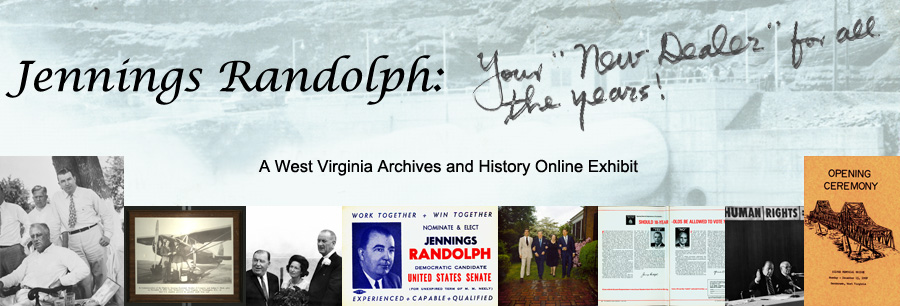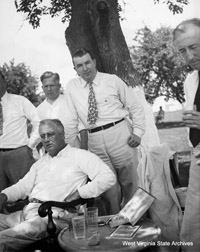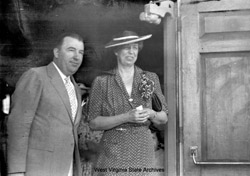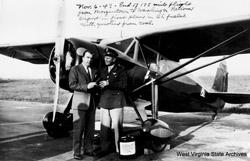
Chapter Two
|
"By acting now we will assuredly make mistakes. But if we don’t act now, I’m afraid that we will not have even the opportunity to make the mistakes a little later." - President Franklin D. Roosevelt |
|
Elected to Congress in 1932, Jennings Randolph served seven terms, 1933-1947. While in the House or Representatives, Randolph was assistant majority whip. He served on the Civil Service Committee for twelve years, serving as the chairman for one year, and on the District of Columbia Committee for fourteen years, seven of which he served as chairman. He also was a member of committees on Labor, Roads, Expenditures, and Mines and Mining. He was chairman of the latter’s Subcommittee on Coal.1 Along with his role on these various committees, Randolph also worked very closely with newly elected President Franklin D. Roosevelt.

Jennings Randolph with President Franklin D. Roosevelt, Mountain State Forest Festival, 1936
|
Randolph’s election to the House of Representatives was part of the Democratic wave ushered in by Franklin D. Roosevelt. He worked extensively with Roosevelt on various “New Deal” projects, and the two formed a strong bond. Randolph also worked closely with Eleanor Roosevelt on certain projects, including the establishment of homestead communities like Arthurdale and Eleanor in West Virginia.2 Randolph’s close ties with the Roosevelts and their ideologies influenced him throughout his political career. |

Jennings Randolph with Eleanor Roosevelt, Charleston, Summer 1938
|
|
During these years Randolph advocated for aviation legislation, arguing that aviation was both vital to the future of the national defense and economy.3 Randolph was instrumental in the passage of the Synthetic Liquid Fuels Act of 1944, which developed plants that produced synthetic fuels from raw materials like coal.4 In November 1943, he made the first flight in a plane fueled by liquified coal from Morgantown, West Virginia, to Washington, D.C. to help strengthen the case for the use of synthetic fuels.
|

Jennings Randolph with first airplane fueled with gasoline made from coal, November 6, 1943
|
Randolph also helped to develop legislation to create funds to develop airports throughout West Virginia, particularly in the northern part of the state. He was also a supporter of the legislation that led to the development of the Civil Aeronautics Act that created the Civil Aeronautics Authority, an agency devoted to promoting safety and progress in the field of aviation.5 In 1946, Randolph proposed legislation to create a National Air Museum as well as a national Department of Peace.6 In 1953, he became chairman of a Commerce Department panel that studied federal aid for airport construction.7 He continued to fight for these causes throughout his time in Congress, finding significant success on both fronts prior to his retirement.
Two other endeavors began in his days in the U.S. House of Representatives: the Randolph-Sheppard Act and lowering the required age to vote to eighteen. Randolph was the primary sponsor of the Randolph-Sheppard Act, passed in 1936, which provided employment opportunities to the blind by allowing them to operate vending facilities on federal property.8 Randolph also attempted to secure the right to vote for citizens who were between the ages of eighteen and twenty, a fight he continued through much of his career.9
Citations
1. Jennings Randolph Biography in “General – Biographies, 1962-1972,” Ms2017-016 (Box 181, Folder 30), Jennings Randolph Collection, WVSA.
2. Michael Barone, "Jennings Randolph."
3. "Aviation and American Welfare," speech by Jennings Randolph, February 20, 1939, Ms2017-016 (Box 601, Folder 8), Randolph Collection, WVSA; "Aviation Builds a New World," speech by Jennings Randolph, 1945-1946, Ms2017-016 (Box 601, Folder 9).
4. "Press Release, Synthetic Liquid Fuels Act, JR made first flight with gas from coal, Arthur C. Hyde, pilot, November 6, 1973," Ms2017-016 (Box 75, Folder 494), Randolph Collection, WVSA.
5. Robert B. Florian, "Mr. Randolph: The Gentleman From West Virginia" (Unpublished biography of Jennings Randolph), p. 100, Florian Collection, WVSA.
6. Jennings Randolph Profile in “Childhood & Youth” Folder, Florian Collection, WVSA.
7. David Stout, "Senator Jennings Randolph of West Virginia Dies at 96," New York Times, May 9, 1998, https://www.nytimes.com/1998/05/09/us/senator-jennings-randolph-of-west-virginia-dies-at-96.html (accessed May 18, 2018)
8. "20 U.S. Code § 107 - Operation of vending facilities," Legal Information Institute, https://www.law.cornell.edu/uscode/text/20/107 (accessed May 18, 2018)
9. Stout, "Senator Jennings Randolph of West Virginia Dies at 96."
|



